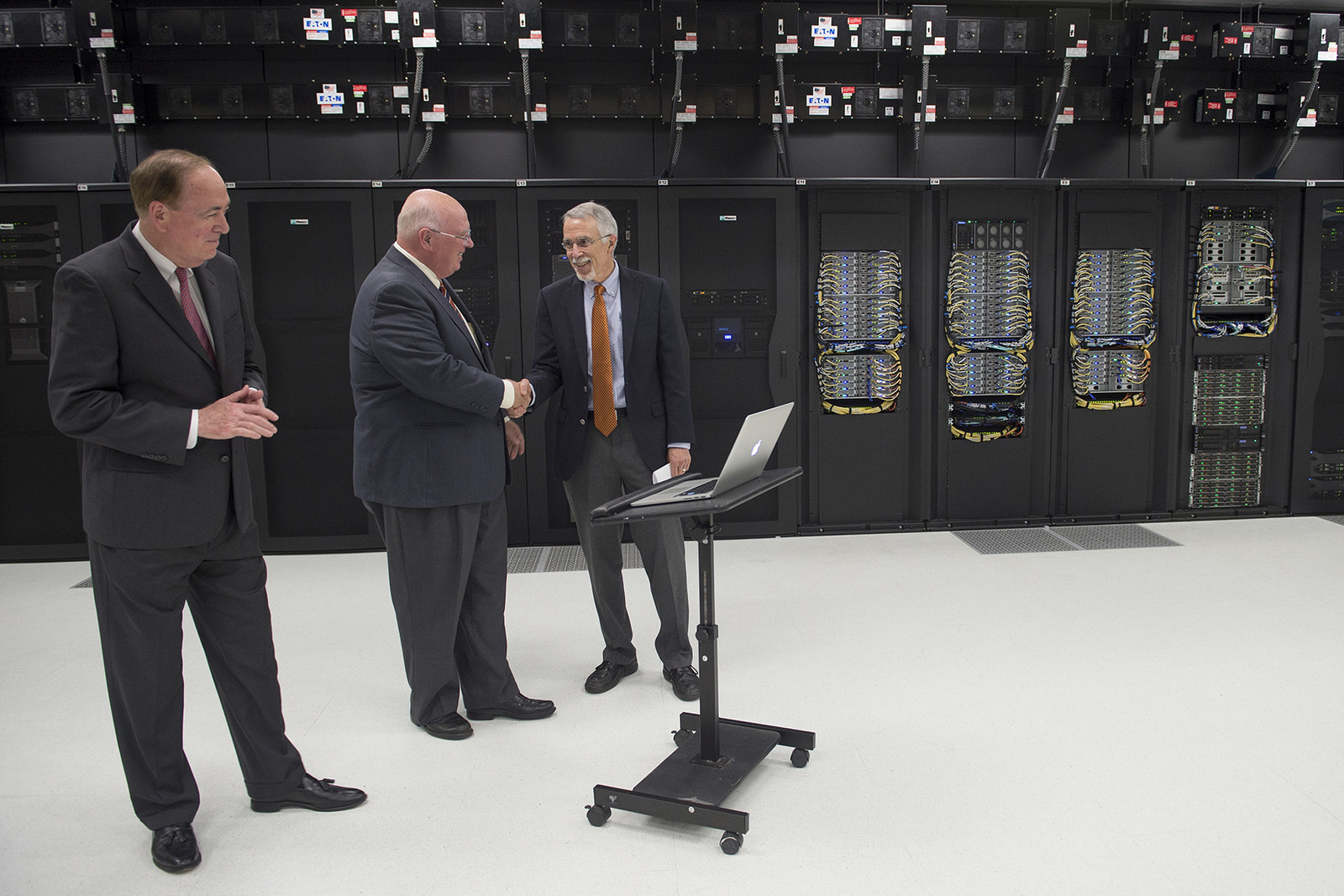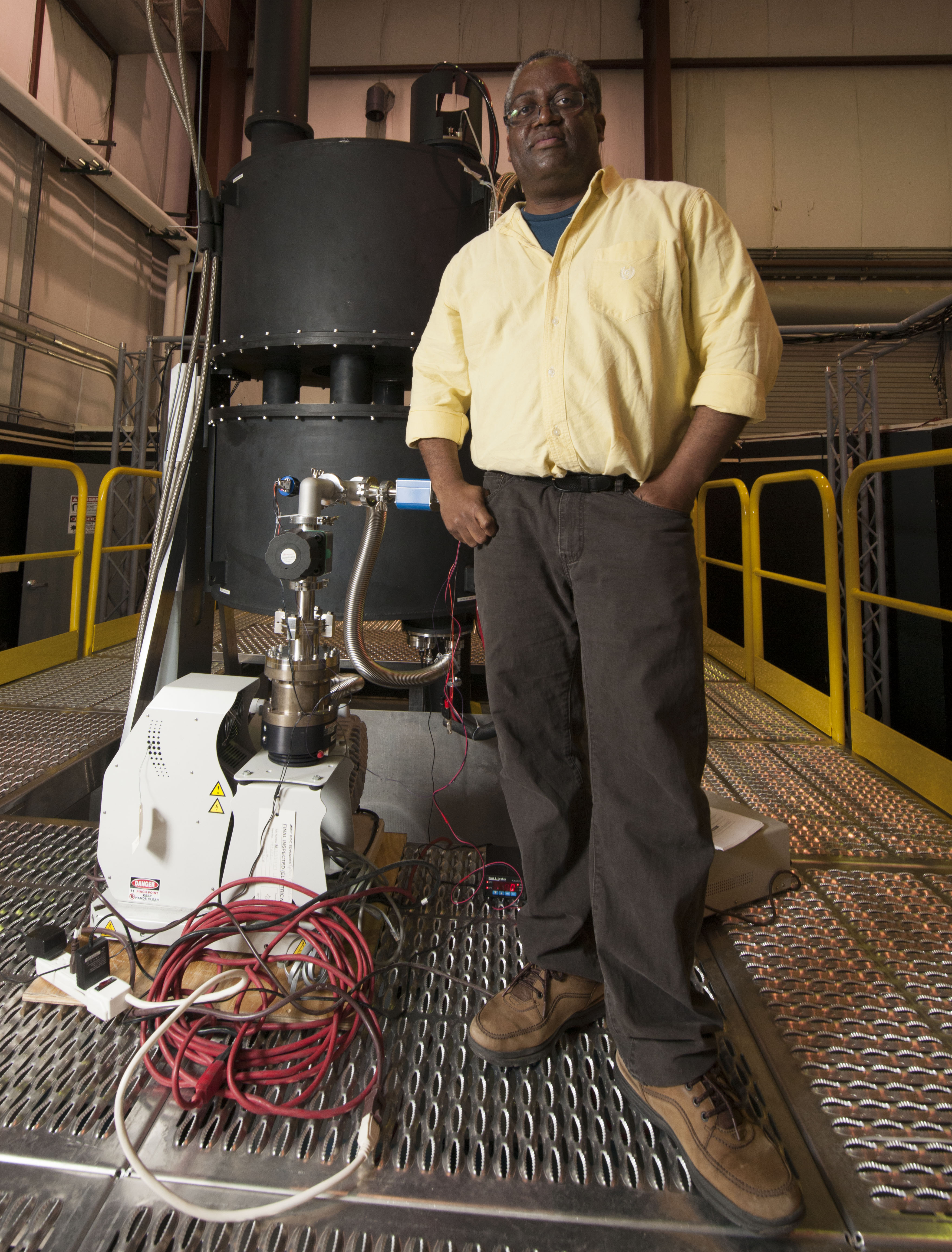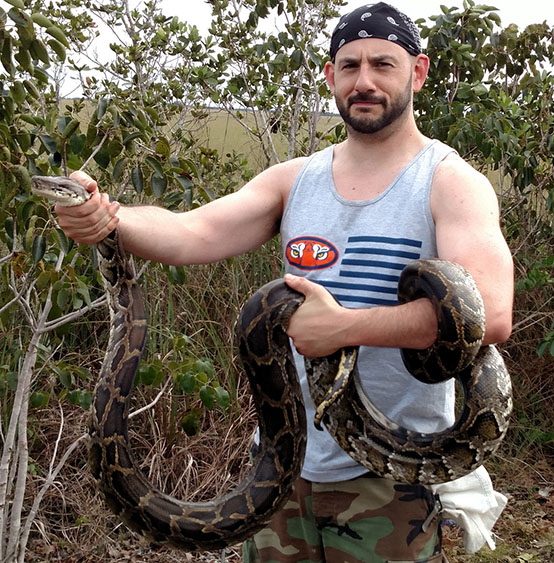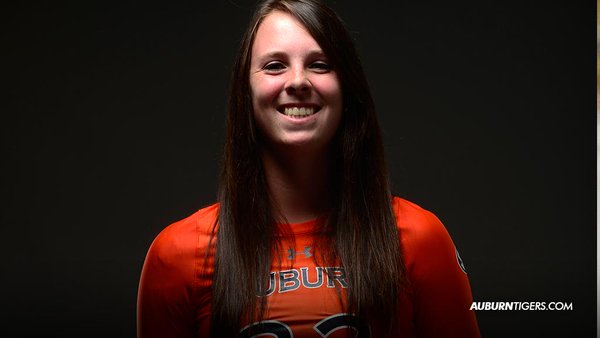
|
|
Auburn University unveils $1 million supercomputer, initiates new technology acquisition plan
Nicholas Giordano, dean of the College of Sciences and Mathematics, along with Bliss Bailey, of the Office of Information Technology, recently led a collaboration across campus to implement a $1 million supercomputer that will enhance research campus wide, from microscopic gene sequencing to huge engineering tasks. The university is also initiating a plan to purchase a new one every few years as research needs evolve and expand.
"Many of our research projects require terabytes of data," said John Liu, Auburn University associate provost and associate vice president for research. "This supercomputer offers Auburn researchers unprecedented computer power. The higher level of capability and capacity allows us to be very competitive in the era of Big Data as we analyze large amounts of information."
The Lenovo supercomputer is actually a collection of 120 computers called "nodes" tied together into a coherent system controlled by a "head node," with its speed ranking in the top 1 percent in the world in terms of access to the large pool of shared storage. Each node has 20 cores that process information, which means 2,400 cores are available for the computational needs of researchers.
The system has more than 16 terabytes of memory and 1.4 petabytes of disk space. One terabyte equals one million megabytes (or 1,000 gigabytes), while one petabyte is 1,000 terabytes. A typical personal computer has 8 gigabytes of memory and disk space that is between 500 gigabytes and 1 terabyte.
Auburn has named its new supercomputer the "Hopper" in honor of the late Rear Admiral Grace Hopper, an extraordinary woman whose work laid the foundation for much of today's computing work.
"Computer technology plays such an important role in all research today," said Nicholas Giordano, dean of the College of Sciences and Mathematics. "Many Auburn faculty and students will benefit from it, and it will help Auburn recruit new faculty, who can hit the ground running."
To read more, click here.
|
|
Take 5 with Ed Thomas

Edward Thomas, professor in the Department of Physics, was born and raised in St. Thomas in the U.S. Virgin Islands. He received his B.S., M.S. and Ph.D. in physics from the Florida Institute of Technology, the Massachusetts Institute of Technology and Auburn University, respectively. He has been a faculty member at Auburn for 16 years and is the Lawrence C. Wit Professor in the College of Sciences and Mathematics, as well as a Charles W. Barkley Endowed Professor. His research is in the area of experimental plasma physics with an emphasis on laboratory simulations of the space environment and fundamental processes of particle and energy transport in plasmas and dusty plasmas. This work is funded through numerous sources including the National Science Foundation, NASA, the Department of Energy and the Department of Defense. Thomas is also very active in science policy and in fostering the next generation of scientists through his advisory roles for the federal government, international organizations, universities, professional societies and his work with the nonprofit organization, Quality Education for Minorities Network.
1. What brought you to Auburn?
For more than 30 years, Auburn University has been building a significant research effort in laboratory, space and fusion plasma physics. This is what originally attracted me to Auburn as a graduate student in the early 1990s to work with the fusion energy research group. After I completed my Ph.D. and was working at Fisk University in Nashville, Tennessee, I was contacted by the Department of Physics at Auburn University with an offer to return as a faculty member. Because there are only a handful of institutions in the United States where plasma science is a major research activity, I was very happy to have the opportunity to pursue a professional career at Auburn and to contribute to the growth of the plasma physics research program.
To read more, click here.
|
|
COSAM biologist seeking invasive Burmese Pythons in Everglades competition

A team led by Auburn University biologist David Steen is participating in the 2016 Python Challenge in south Florida. The event, sponsored by the Florida Fish and Wildlife Conservation Commission and the Fish and Wildlife Foundation of Florida, is geared toward eradicating the Burmese Python from the region and raising awareness of the serious consequences posed to the environment by the invasive predators.
Competitors are tasked with finding and capturing as many Burmese Pythons as possible between Jan. 16 and Feb. 14. Top awards go to the team with the most captured pythons and the team that captures the longest python. The search area consists of 1.5 million acres of swamp and sawgrass, terrain that provides easy camouflage for the snakes. Although it is estimated that as many as 100,000 Burmese Pythons inhabit the Everglades, in 2013, the only other time the Python Challenge took place, approximately 1,600 people participated and only 68 pythons were captured.
The reason for such a low number of captured snakes is their superior camouflaging ability. Steen, who received a doctorate in biological sciences from Auburn in 2011 and is now an assistant research professor in the university's College of Sciences and Mathematics, said his team has utilized a variety of hunting techniques to increase the chance of locating and capturing pythons.
The team has driven a vehicle, which allowed them to quickly scan the landscape hoping to stumble upon a snake crossing the road or basking in the sun; they have walked approximately 35 miles, slowly searching every nook and cranny along a canal; and they have used a bicycle in an attempt to cover more ground while others remain on foot. The bicycle technique has proven the most successful thus far.
To read more, click here.
|
|
Campbell nominated for Barry M. Goldwater Scholarship

Stephanie Campbell, a double major in animal sciences and microbial, molecular and cellular biology, has been nominated for the prestigious Barry M. Goldwater Scholarship.
Campbell, from Wildwood, Mo., is a middle-blocker on the Auburn Volleyball team. For the past two years, she has worked under the direction of Terry Brandenbourg, associate professor in the Department of Animal Sciences, investigating clock gene expression in porcine adipose and pituitary tissue in lean and obese pigs. Her research will play a role in better understanding the development of obesity. Stephanie has presented her research findings at national and regional conferences, and she has a co-authored journal article under review.
Among her many awards and honors, she was a Cellular, Molecular and Biological (CMB) Summer 2014 Research Scholar, elected to membership to the national honor society of Phi Kappa Phi last spring, named the 2015-2016 SEC Volleyball Scholar Athlete of the Year, and since her freshman year, has been named to the SEC Academic Honor Roll. Campbell was also named to the 2014-2015 CoSIDA Academic All-District 1st Team.
|
Upcoming Events:
COSAM Today is a bi-monthly newsletter provided by the College of Sciences and Mathematics Office of Communications and Marketing.
We want to hear from you! Do you have news to share? Let us know by filling out this form. If you have questions, send an email to ceh0012@auburn.edu.
For more news about COSAM, visit the website at www.auburn.edu/cosam.
To unsubscribe from this newsletter, send an email to cosam@auburn.edu.
|




